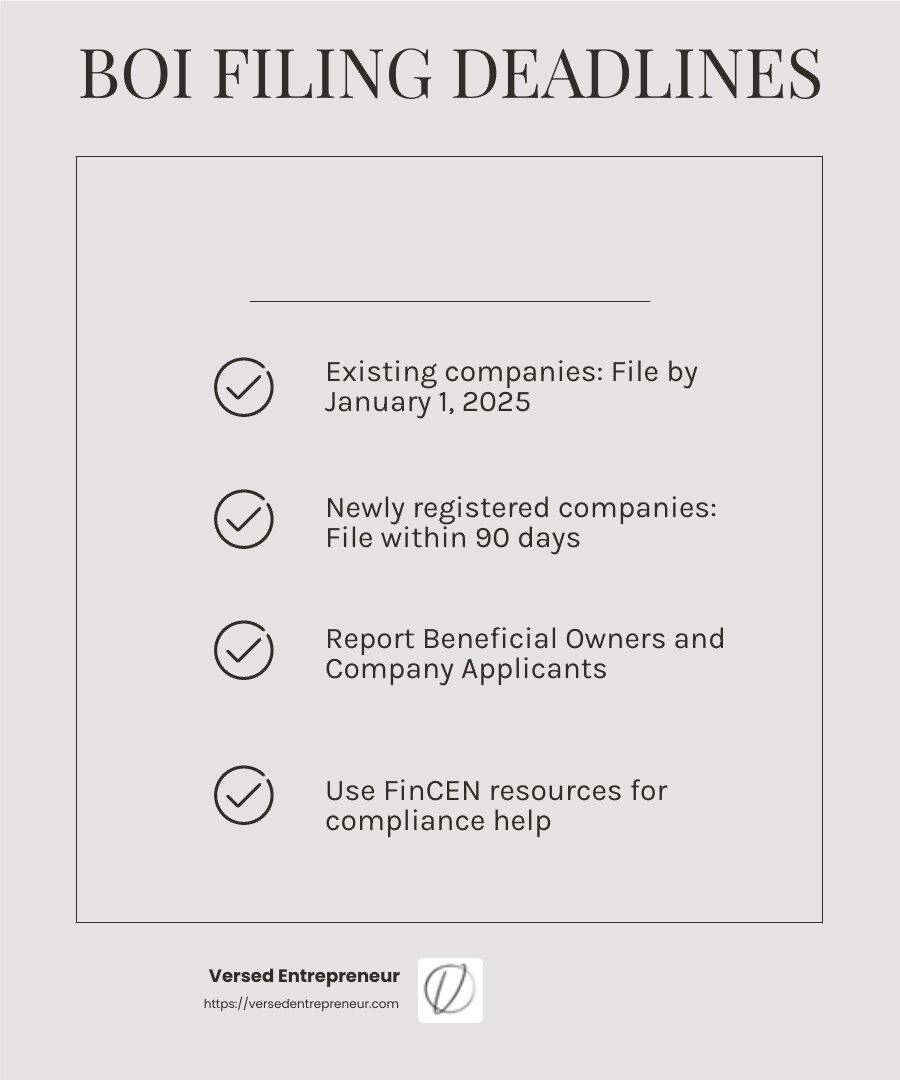Corporate Transparency Act Beneficial Ownership is a pivotal measure designed to combat financial crimes and increase accountability among businesses. This legislation requires certain companies to disclose vital information about their ownership structure, ensuring transparency in business operations. Key points include:
- Companies must report their ownership details to FinCEN by January 1, 2025.
- Collecting information such as names, birthdates, and identification numbers is mandatory.
- Deadlines differ for companies depending on the date of their formation.
Understanding corporate transparency act beneficial ownership is crucial for businesses to stay compliant. This act aims to curb illegal activities, like money laundering, by mandating the disclosure of beneficial ownership. Small business owners and aspiring entrepreneurs should be aware of these requirements to avoid penalties and maintain trust with stakeholders.
As Gabrielle Reese, I specialize in providing clear and practical guidance on complex topics like corporate transparency act beneficial ownership. My background in business administration and entrepreneurship, combined with my experience in empowering small business owners, equips me to guide you through the essentials of this domain and ensure you understand its significance in today’s business landscape.
Essential corporate transparency act beneficial ownership terms:
– boi report
– corporate transparency act 2024
The Corporate Transparency Act (CTA) is a significant piece of legislation designed to enhance business transparency in the United States. Enacted as part of the Anti-Money Laundering Act of 2020, the CTA officially took effect on January 1, 2024. Its primary aim is to combat financial crimes such as money laundering, tax evasion, and terrorist financing by requiring companies to report information about their beneficial owners to the Financial Crimes Enforcement Network (FinCEN).
Background and Development
The CTA was introduced to address the growing issue of shell companies being used for illicit activities. These companies often obscure the identities of their true owners, making it challenging for law enforcement to track down criminals. By mandating the disclosure of beneficial ownership information, the CTA seeks to close this loophole and equip authorities with the necessary tools to identify and prosecute wrongdoers.
The law was part of the National Defense Authorization Act, which was initially vetoed by then-President Donald Trump. However, Congress overrode the veto, demonstrating broad bipartisan support for measures to improve financial transparency and security.
Objectives of the Corporate Transparency Act
The CTA has several key objectives:
-
Preventing Financial Crimes: By requiring companies to report their beneficial owners, the CTA aims to deter money laundering, tax fraud, and other illegal activities. It provides a clear picture of who controls U.S. businesses, making it harder for criminals to hide behind anonymous entities.
-
Enhancing National Security: The law supports efforts to combat terrorism financing by ensuring that funds cannot be easily moved through opaque corporate structures.
-
Increasing Accountability: The CTA improves corporate accountability by creating a national registry of beneficial owners. This registry helps regulators and law enforcement agencies monitor and investigate suspicious activities more effectively.
-
Reducing Regulatory Burden: While the CTA imposes new reporting requirements, it also seeks to minimize the burden on businesses by exempting certain entities and providing clear guidelines for compliance.
The Corporate Transparency Act represents a significant step forward in the fight against financial crime. By shining a light on the true owners of businesses, it seeks to create a more transparent and secure economic environment for everyone.
Next, we’ll explore the specific reporting requirements under the CTA, including what information companies need to provide and the deadlines they must meet.
Table of Contents
ToggleBeneficial Ownership Information Reporting Requirements
Under the Corporate Transparency Act, businesses must disclose details about their beneficial owners to FinCEN. This requirement applies to many companies operating in the U.S., with specific deadlines and information needed depending on when the company was created or registered.
Existing Companies
If your company was created or registered in the U.S. before January 1, 2024, you’re considered an “existing company” under the CTA. You have until January 1, 2025, to file your initial Beneficial Ownership Information (BOI) report. This report isn’t an annual requirement; you only need to submit it once, unless updates or corrections are necessary.
What to Include in Your BOI Report:
- Beneficial Owners:
- Full name
- Date of birth
- Residential address
-
Identifying number from a valid ID (e.g., U.S. driver’s license)
-
Company Information:
- Legal name
- Trade names (if any)
- Principal place of business address
- Jurisdiction of formation
- Taxpayer Identification Number (TIN)
Newly Created or Registered Companies
For companies created or registered on or after January 1, 2024, the rules are slightly different. You have 90 calendar days from the date your company is officially recognized to file your BOI report. This timeframe ensures new businesses quickly comply with transparency requirements.
Filing Requirements for New Companies:
- Beneficial Owners and Company Applicants:
-
Similar information as existing companies, including identification details for individuals who helped form the company.
-
Newly Formed Entities:
- Additional details about company applicants, the individuals responsible for filing creation documents.
Ensuring Compliance:
FinCEN has provided a range of resources to help businesses steer the BOI reporting process. From compliance guides to webinars, these tools are designed to make filing as straightforward as possible.
In the next section, we’ll explore how to file your beneficial ownership information, including step-by-step guidance and available resources to ensure you meet all requirements.
How to File Beneficial Ownership Information
Filing your Beneficial Ownership Information (BOI) report doesn’t have to be daunting. Let’s break it down into simple steps, focusing on the details you need to gather and the resources available to help you.
Required Information for Beneficial Owners
When you’re ready to file, you’ll need to provide specific details about each beneficial owner of your company. Here’s what to include:
- Full Name: The complete legal name of the beneficial owner.
- Date of Birth: The exact date they were born.
- Address: The residential address where they currently live.
- Identification Documents: A unique identifier from an acceptable ID, like a non-expired U.S. driver’s license, passport, or another government-issued ID. You’ll also need to submit an image of this document.
Required Information for Reporting Companies
Your company also needs to report its own details. Here’s what to have on hand:
- Company Name: The official legal name of your business.
- Trade Names: Any “doing business as” (d/b/a) or “trading as” (t/a) names.
- Company Address: The principal place of business in the U.S. If your main office is abroad, report the U.S. address where business is conducted.
- Taxpayer Identification Number (TIN): Your company’s TIN or, for foreign companies without a U.S. TIN, a tax ID from another jurisdiction.
- Company Applicants: For companies formed after January 1, 2024, include details about the individuals who filed the formation documents.
Filing Process and FinCEN Guidelines
The Financial Crimes Enforcement Network (FinCEN) has made the filing process straightforward and free of charge. Here’s how you can file:
- Gather Information: Use checklists from FinCEN’s Small Entity Compliance Guide to ensure you have all required details.
- Submit Online: File your BOI report through FinCEN’s secure online portal. It’s user-friendly and designed to protect your sensitive information.
- Use Available Resources: FinCEN offers webinars, FAQs, and a contact center to answer your questions. These tools are invaluable for ensuring you meet all compliance requirements.
FinCEN has emphasized that compliance is crucial for transparency and combating financial crimes. By following these steps and utilizing the resources available, you can ensure your business remains in good standing with the law.
In the next section, we’ll dive into compliance and enforcement, exploring the penalties for non-compliance and the exemptions available under the Corporate Transparency Act.
Compliance and Enforcement
Navigating the compliance landscape of the Corporate Transparency Act can seem overwhelming, but understanding the exemptions and potential penalties is key to staying on the right side of the law.
Exemptions to the Corporate Transparency Act
Certain entities are exempt from filing Beneficial Ownership Information (BOI). These exemptions are critical, as they relieve specific organizations from the reporting requirements. Here’s a quick look at who qualifies:
-
Regulated Entities: Financial institutions, insurance companies, and other regulated entities are generally exempt. This is because they already report similar information to other government agencies.
-
Large Operating Companies: Companies with more than 20 full-time employees in the U.S., over $5 million in annual revenue, and a physical office in the U.S. can qualify for this exemption. However, you cannot combine employees across related companies to meet this threshold.
-
Subsidiaries of Exempt Entities: If a subsidiary is wholly owned by one or more exempt entities, it might be exempt. However, if even a small percentage of ownership is held by a non-exempt entity or individual, the exemption doesn’t apply.
-
Nonprofit Organizations: Certain nonprofits are exempt, recognizing their unique structure and oversight.
For more detailed information, consult the FinCEN Small Entity Compliance Guide, which provides comprehensive checklists and definitions of exempt entities.
Penalties for Non-Compliance
Failing to comply with the Corporate Transparency Act can lead to serious consequences. Here’s what you need to know:
-
Civil Penalties: Companies that miss filing deadlines face fines of up to $500 per day. This can quickly add up, reaching a maximum of $10,000.
-
Criminal Penalties: Willfully failing to file or providing false information can result in criminal charges. This includes fines and up to two years in prison.
-
Liability for Individuals: Individuals, such as beneficial owners or company applicants, can also be held accountable if they cause a company to fail in its reporting duties. They may face similar penalties as the company itself.
FinCEN takes non-compliance seriously and emphasizes that ensuring accurate and timely reporting is essential for transparency and combating financial crimes.
By understanding these penalties and exemptions, you can better steer the requirements of the Corporate Transparency Act. In the next section, we’ll explore the impact of the Act on small businesses and the resources available to assist them.
Impact of the Corporate Transparency Act on Small Businesses
The Corporate Transparency Act introduces new reporting requirements that can be challenging for small businesses. Many small business owners are unfamiliar with these regulations and might find compliance daunting. However, there are resources available to help make this process smoother.
Resources for Small Businesses
1. FinCEN Compliance Guide:
FinCEN offers a Small Entity Compliance Guide that breaks down the reporting requirements into simple steps. This guide includes checklists to help small businesses identify necessary information about their company and beneficial owners. It’s a valuable resource for understanding what needs to be filed and how to do it correctly.
2. Webinars and Virtual Information Sessions:
FinCEN, in collaboration with the Small Business Administration (SBA), hosts webinars and virtual sessions to explain the reporting requirements. These sessions provide real-time answers to common questions and practical tips for compliance. For instance, a virtual session is scheduled for July 24, 2024, where experts will walk participants through the filing process. Register here to attend.
3. FAQs and Online Resources:
FinCEN’s website features a comprehensive FAQ section that addresses common concerns and clarifies complex aspects of the Act. This section is continuously updated to reflect new developments and provide clarity on ambiguous points, such as what constitutes “substantial control” over a company.
4. Legal and Consulting Services:
For businesses needing personalized guidance, consulting with legal experts or business consultants can be beneficial. These professionals can offer custom advice and help ensure that your business meets all compliance requirements.
Understanding these resources can significantly ease the compliance burden for small businesses, helping them steer the complexities of the Corporate Transparency Act. In the next section, we’ll tackle some frequently asked questions about beneficial ownership and transparency.
Frequently Asked Questions about Corporate Transparency Act Beneficial Ownership
What is the beneficial ownership rule in the Corporate Transparency Act?
The beneficial ownership rule is a fundamental aspect of the Corporate Transparency Act. It mandates that certain companies must report details about individuals who own or control the company to FinCEN. A beneficial owner is defined as anyone who exercises substantial control over a company or owns at least 25% of it. This rule aims to deter illicit activities such as money laundering and tax evasion by reducing the anonymity of company ownership.
FinCEN, the Financial Crimes Enforcement Network, is a bureau of the U.S. Department of the Treasury responsible for collecting and maintaining beneficial ownership information. This information is accessible to law enforcement and other authorized entities, ensuring its effective use in combating financial crimes.
What is beneficial ownership transparency?
Beneficial ownership transparency involves the openness and accessibility of information regarding individuals who ultimately own or control companies. The Corporate Transparency Act seeks to establish a registry where this information is stored, facilitating the identification and tracking of ultimate company owners by authorities. This transparency is vital for preventing illegal activities and enhancing accountability in business operations.
The registry is not publicly accessible. Access is restricted to specific government agencies, financial institutions, and other authorized users who require the information for anti-money laundering and counter-terrorism efforts.
What is the beneficial ownership rule in 2024?
In 2024, the beneficial ownership rule requires all reporting companies to file an initial BOI report with FinCEN. Companies created or registered before January 1, 2024, must submit this report by January 1, 2025. Newly created or registered companies in 2024 have 90 calendar days to file their initial report after their creation or registration becomes effective.
Adhering to this compliance timeline is essential for companies to fulfill their reporting obligations punctually. Missing these deadlines can lead to significant penalties, so it is crucial for companies to understand the timeline and prepare their reports accordingly.
For more detailed guidance, companies can refer to FinCEN’s resources and compliance tools, which offer step-by-step instructions and support to help businesses meet their reporting requirements and avoid potential fines.
Next, we will explore the conclusion of the article, highlighting the importance of compliance with the Corporate Transparency Act.
Conclusion
The Corporate Transparency Act is a significant step toward enhancing transparency in business operations. By requiring companies to disclose information about their beneficial owners, the Act aims to deter illicit activities like money laundering and tax evasion. This transparency is not just a regulatory requirement; it’s an opportunity for businesses to build trust with stakeholders, including customers, investors, and regulators.
At Versed Entrepreneur, we understand the complexities businesses face in navigating these new requirements. Our mission is to provide comprehensive resources and insights to help businesses not only comply with the Act but also leverage transparency to improve their reputation and operational integrity. For businesses looking to understand and meet these requirements, our business licenses and permits page offers valuable guidance.
Compliance with the Corporate Transparency Act is crucial. It ensures that businesses are not only adhering to legal obligations but also contributing to a more transparent and accountable business environment. As the deadlines approach, it’s essential for companies to stay informed and prepared. Use the resources available, consult with experts if needed, and take proactive steps to meet your reporting obligations.
By doing so, businesses can avoid potential penalties and foster a culture of transparency that benefits everyone involved. Compliance is not just about following the rules—it’s about building a better future for your business and the community it serves.












